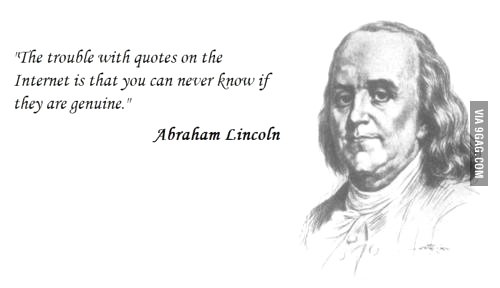You receive inputs (audio, visual, touch, smell, taste) and give outputs (verbal, written, movement) as responses. Artificial intelligence tries to give the same outputs, without knowing what's really going on inside the box. The computer isn't really thinking, it's just giving the illusion of thought.
Earlier this week, Microsoft released an artificial intelligence bot called Tay on twitter, so that it could learn how to engage in conversation based on how people responded to it. Within 24 hours, the bot had been trained to give racist, sexual, and otherwise inappropriate comments (see the news article here). I say "trained" because algorithms like Tay will only produce results according to how they are trained, and it is the human interaction that trains them. Essentially, Tay became a mirror which shows us what someone can learn from the internet in a 24-hour period.
I'm not someone who is against the internet ... in fact I make my living from it: I work on networking equipment and software at HPE. The internet can be used for very many good things: sending messages of encouragement, spreading the truth, maintaining healthy relationships with remote family and friends, buying cheap stuff, and hopefully this blog. Along with these benefits comes great risk.
Many of us are aware of the dangers that lurk on the internet. These are dangers which exist in real life, but are in many ways amplified and more easily obtained via the internet. These dangers include:
- Pornography
- Child predators
- Falsehood in various forms (like slander)
- Identity theft
- Computer viruses
- Drug trafficking (see Silk Road)
- Cyber warfare (see Stuxnet and Rye Dam)
Instant, worldwide communication makes us more aware of the world's evils, giving rise to a potential callous toward the evils we now commonly see. Evil becomes more commonplace and possibly more accepted. School shootings and terrorist bombings now feel commonplace because we hear about them so frequently from our always-connected society. Worldwide connectivity means that regardless of how evil or misdirected our behaviors and attitudes, we can always find a group of like-minded people who will validate and encourage us to continue down an incorrect path.
One of the most threatening dangers of the internet is that it convinces us it's real. Things on the internet do originate from real people, but the internet is not a reality itself. The more time we spend on the internet, the more we think that ideas and attitudes we find there are what actually matters. The damage comes when we get convinced that those ideas and attitudes are more important than real life. How often have you looked around a room (not a chat room, a real room) and seen everyone consumed by their own view of the internet through their phone screen?
The internet can be an artificial reality. Just as artificial intelligence emulates real intelligence, the internet has emulated reality. We can interact socially with other humans, so it gives the illusion that we have real relationships with real people. We can watch a video, which gives us the illusion that we experienced what that video recorded. However, what you see on the internet is a filtered subset of a real person. To some extent this happens in-person as well, but to a much smaller degree. Many more personal visual queues (facial expression, minor movements, voice tone) give away a hidden meaning that isn't expressed verbally. Ask someone "How is your day?" and you'll invariably hear a response like "Good", even if their face looks worn and stressed. The internet deprives us of these minor queues, so we're left believing that "Good" (or whatever the person chooses to reveal) is the reality.
For example, consider the birth of my daughter, Dottie. I haven't posted details of her repeated crying because she is hungry, bored, or just likes the sound of her own voice. Someone reading the blog would think that she cries very rarely. They might even look at their own baby and wonder why their baby cries so much. That might make this person feel worse about their own baby or themselves, because their baby cries often and mine apparently doesn't. This is a simple example, but it shows how the perceived reality of the internet can have a negative impact on real life.
This concept extends in many destructive forms. Online bullying has caused depression and suicide, because the internet enables anyone to hurl insults and slanderous accusations with no perceived repercussions. Online relationships have destroyed families because an extra-marital relationship shows only positives, with none of the negatives or responsibilities that in-person relationships carry. By tricking ourselves into thinking that the internet constitutes reality, we've given the internet the ability to damage our real lives as much as it can enhance them.
So what is the solution? At this point, it isn't realistic to completely disconnect from the internet. We don't throw out our phone line (or cell phone) because of phone scammers, because phones are still a great communication tool. However, scammers change our perception of phones and how we interact with someone on the other end of the line. We don't throw out our cars because of the possibility of an auto accident, because we value the speedy transportation. Caution and consequences enter our minds when we use these innovations.
In the same way, our perception of internet dangers should change our perception of the internet and how we interact with someone over it. We should realize that the ideas and attitudes we see there are based on reality, but not reality themselves. Just as we teach our children that what they see on TV isn't real, we should teach them that what they see on the internet isn't real either (just don't say that about this blog post, or the world will implode due to the paradox). We are raising a generation of children who will grow up having the internet as an integral part of their lives, meaning that the social habits and skills they develop will be different from our own. A proper perspective toward the internet may make it a little less enjoyable, but isn't that the point?
The devil harms us by convincing us he isn't real, leaving us unprepared to defend against his schemes. The devil destroys us further by convincing us that the internet is real, leaving us saturated in a world that detaches us from reality. What I've referred to as "reality" in this post isn't the true life that the bible refers to, but its yet another curtain of abstraction that makes it difficult for our eyes to see the truth. I encourage us all to see past these curtains and live the life that Christ desires of us.
"In this way they will lay up treasure for themselves as a firm foundation for the coming age, so that they may take hold of the life that is truly life."
- 1 Timothy 6:19
- 1 Timothy 6:19





Just wanna say I really love this post. Eye openin
ReplyDelete